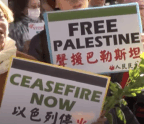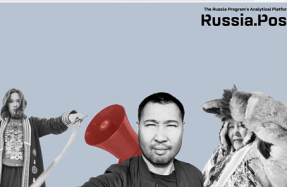As pessoas precisam de sentir que o Estado funciona, porque os seus fundamentos estão destruídos. A justiça, liberdade e fraternidade, que se resume à dignidade humana não existe em Angola.
Soldiers Outnumber Residents in Angola’s Oil-Rich Cabinda, Says Activist Marcos Mavungo

Activism in Africa International Conference, organized by the Center for International Studies of the Instituto Universitário de Lisboa (CEI-IUL), took place at ISCTE-IUL on January 11-13, 2017. Photo by Hugo Alexandre Cruz. Published with permission.
“There’s no water, no light. There is hunger.” This was how the civic activist José Marcos Mavungo described during a conference in Lisbon in January the harsh reality of living in Cabinda, an exclave of Angola, separated from the country by a narrow strip of territory belonging to the Democratic Republic of Congo.
The region of Cabinda was a Portuguese protectorate from 1885 until 1956 when the colonial rulers decided to transfer its government to Angola, a much older colony located south of the Congo river. Rebellion began immediately and continued after the Portuguese empire fell in 1975, after which Angola, as a new independent state, kept sovereignty over Cabinda.
Created in the 1960s, a group called the Front for the Liberation of the Enclave of Cabinda (FLEC) still strives for the region's independence through armed struggle, although in recent years it has broken up in multiple rivaling factions. The war waged between them and the Angolan state has taken a toll on Cabinda's population.
At the core of the conflict, however, is the territory's immense riches: Cabinda holds one of the largest off-shore oil fields in the world and accounts for about half of Angola's oil exports, says news agency Reuters, which in turn accounts for more than 95% of the country's total exports, according to data from the World Bank. As Mavungo himself put it:
Cabinda é um território escandalosamente rico, um dos raros países onde Deus abriu a mão para tudo, petróleo, diamantes, ouro, madeira, café. [Por esta razão] o regime angolano depositou o seu poder militar na região. Atualmente existem mais militares do que população em Cabinda.
Cabinda is a scandalously rich territory, one of the rare countries where God opened his hand with everything, oil, diamonds, gold, wood, coffee. [That's why] the Angolan government has put its military power in the region. Now there are more soldiers in Cabinda than its population.
In this context, in 2003 Mavungo founded Mpalabanda, a civic association from Cabinda with the objective of peacefully resist to war, oppression and corruption in the region. But Cabinda's first human rights organization was short-lived: three years later, Mpalabanda was made illegal by the Provincial Court of Cabinda.
In 2015, Mavungo was imprisoned by Angolan authorities, accused of “inciting rebellion and violence.” He was sentenced to six years in prison, but in May of the following year was acquitted by the Angolan Supreme Court due to lack of evidence. He spent a year in prison.
The activist was recently in Portugal to participate in the “Congresso Ativismos em África” (Activism Congress for Africa) held by the Centre for International Studies of ISCTE-the Lisbon University Institute, where he discussed the current situation in Cabinda, remembered his time in prison and shared thoughts on the future of Angola.
When Angola gained independence from Portugal in 1975, Cabinda began a period of “despotic feudalism resulting from a disastrous decolonization process,” he said:
Após a independência, Angola entrou num conflito que desarticulou as mentes e onde o político acabou por escorregar numa governação criminosa que legítima o crime como os acontecimentos de 27 de Maio (1977), a sexta-feira sangrenta (1993), os assassinatos de Cassule e Kamulingue (2012) e a experiência trágica vivida por Filomeno Vieira Lopes que não cometeu outro crime senão contestar.
[Desde então, cidadãos vivem em] ambiente hostil, onde os detentores do poder se apoderaram de tudo que é recurso nacional em especial o petróleo e os diamantes e depois criaram um gueto económico onde é notório os propósitos de rapina – que vem debicar tudo que é recurso, apanham tudo – é nesse contexto que aparece a governação corrupta onde os governantes em vez de governarem aparecem como comerciantes e as próprias politicas são estruturadas para enviar a riqueza para eles próprios e a tirar do pais. Todo o mundo fala que Angola investiu em Portugal, França e Inglaterra, mas em Angola não [há investimento]. Está na pobreza.
After independence, Angola fell into a long conflict which disturbed people’s minds, where politics slid into criminal governance that legitimized crime such as the events of 27 May (1977), “bloody Friday” (1993), the killings of Cassule and Kamulingue (2012) and the tragic experience of Filomeno Vieira Lopes who committed no other crime than dissenting.
Since then citizens have lived in a hostile environment where those who hold power appropriated all national resources, especially oil and diamonds, and then created an economic ghetto notorious for robbery – they come to take all resources, acquiring everything – it is in this context that corrupt governance appeared where the rulers, instead of governing, seemed more like merchants and their politics were structured to send the wealth to themselves and take it from the country. Everyone says that Angola invested in Portugal, France, and the UK, but in Angola no [there is no investment]. It is in poverty.

Activism in Africa International Conference, organized by the Center for International Studies of the Instituto Universitário de Lisboa (CEI-IUL), took place at ISCTE-IUL on January 11-13, 2017. Photo by Hugo Alexandre Cruz.. Published with permission.
As a result of exploiting the “black gold,” Cabinda is an extremely polluted region. “The waters are polluted, illnesses spread, especially among the children,” Mavungo explained.
Also reflecting on the oil production, he added:
Produz-se muito petróleo, mas não investimento de fundo. Há investimento para o mundo ver, bons escritórios e carros de luxo, enquanto a indústria e a agricultura é ignorada. Há uma hipertrofia da classe política dominante que fica com o grosso dos recursos. Estamos perante um feudalismo despótico, uma ditadura dos verdadeiros adoradores do Deus Mamon [riqueza, cobiça], adorado em Angola. É nesse contexto que se desenrola a nossa luta cívica.
It produces a lot of oil, but no in-depth investment. There is investment for the world to see, nice offices and luxury cars, while industry and agriculture are ignored. There is an excessive growth of the dominant political class that keeps the bulk of the resources. We are faced with a despotic feudalism, a dictatorship of the true worshipers of the God Mammon [of wealth and greed], adored in Angola. This is the context that our civic struggle is happening in.
The lack of investment in areas like health and agriculture have led to an increased mortality rate, he said:
A crise é tão grande, a fome é tanta, a doença é tanta que as pessoas morrem como galinhas. Já não há lugar para tantos mortos. Os cemitérios ocupam tanto espaço como a própria cidade.
The crisis is so big, hunger is so bad, illness is so bad that people die like chickens. Already there is not enough room for so many dead. The cemeteries occupy as much space as the actual city.
During the presentation, the activist also recalled the time he was imprisoned:
No dia 14 de março de 2015, pensamos em fazer uma manifestação [de protesto contra a falta de recursos para a população] então enviamos uma carta ao governador para informar da ação. Para informar a polícia que íamos fazer uma ação pacífica [de protesto] na rua. Mas, fui preso. A carta foi assinada por cinco de nós, mas apenas eu fui preso. Acusado de posse de explosivos.
On 14 March 2015, we thought of and held a demonstration [protesting the lack of resources for the population] and then sent a letter to inform the governor of the event. To inform the police that we were going to hold a peaceful protest in the street. But I was detained. The letter was signed by five of us, but only I was detained. Accused of possessing explosives.
Mavungo initially faced 12 years in prison, proposed by the prosecutor, but the judge reduced the sentence to six. The activist says he became even stronger during his detention thanks to international pressure and support. During the year he was imprisoned, Mavungo became ill, and saw his income cut, leaving him unable to support his family. He said his wife was threatened by security agents and he was also threatened inside prison. However, Mavungo said he had never lost his faith due to the “strength of God.”
At the closing of the congress, Mavungo said Angola is facing a big challenge in its democratization:
O autoritarismo da classe política dominante é um entrave à participação eficiente do cidadão na gestão pública. Esse feudalismo despótico impede a implementação de instituições estáveis e da erradicação da pobreza.
The authoritarianism of the dominant political class is a hindrance to the efficient participation of citizens in political management. This despotic feudalism impedes the “implementation of stable institutions and the eradication of poverty.
For this reason, Mavungo and his peers are very uneasy about Angola’s future, and he believes that there will need to be “a great explosion” [of change] in the country. The activist ended by saying:
People need to feel that the state functions, because now its foundations are destroyed. Justice, liberty, and brotherhood, which comprise human dignity, do not exist in Angola.
Originally published in Global Voices.






